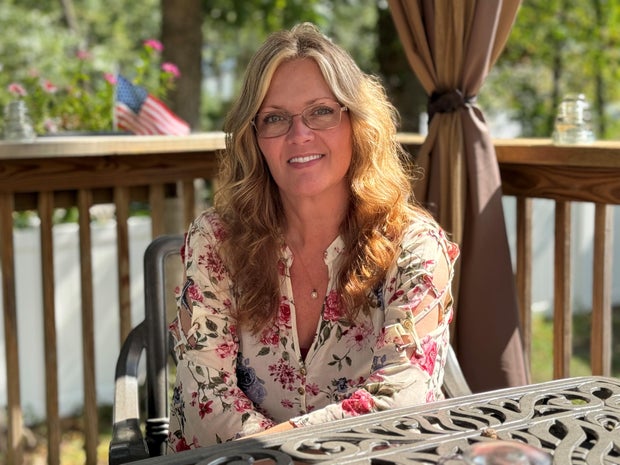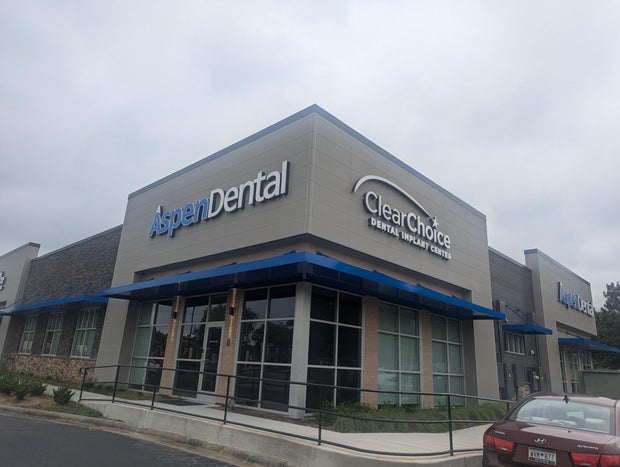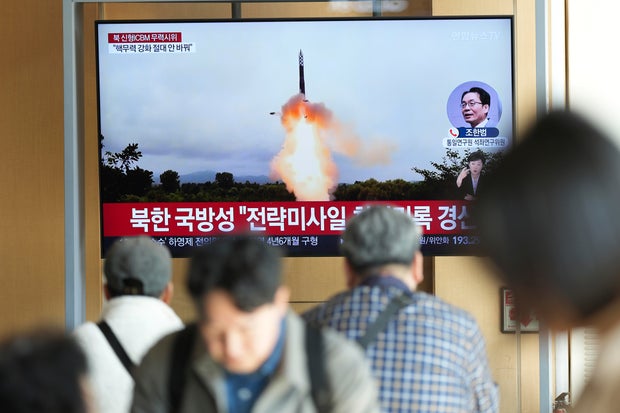CBS News
Asher Grodman talks “Ghosts” season four and his characters new role in the real world

Watch CBS News
Be the first to know
Get browser notifications for breaking news, live events, and exclusive reporting.
CBS News
Halloween haunted houses are a scary business proposition, operators say

The faint of heart should think twice before setting foot in a haunted house for Halloween. The same could be said for those considering getting into business of running a haunted house.
“The barriers of entry are so much higher to get into the haunted house attraction business — rules, regulations and the expense to get in, even what people perceive as entertainment,” said Billy Messina, co-creator of Netherworld, an attraction that has been scaring people in Stone Mountain, Georgia, for nearly 30 years. “A bunch of teenagers that say ‘Boo!’ — that won’t fly anymore,” Messina told CBS MoneyWatch.
Netherworld Haunted House
Unlike the haunted house fundraisers run by civic organizations such as the United States Junior Chamber, also known as the Jaycees, Netherworld is among the dozen or so haunted houses that can be likened to full-scale Broadway productions. And, unlike the neighborhood house that is haunted by volunteers, these Halloween attractions are professional outfits staffed throughout the year, even though the window to turn a profit is far smaller, just a month or two around Halloween.
“Our revenue cycle is very short, the lion’s share of our revenue is in a 2- to 3-month window,” said Chris Stafford, CEO and founding partner of Thirteenth Floor Entertain Group. Based in Denver, Colorado, Thirteenth Floor operates 32 attractions including haunted houses and Halloween festivals across the country, selling hundreds of thousands of tickets each year.
“Most of our properties we hold year-round, so we have an annual operating plan to make sure the revenue we expect to see is going to come in,” said Stafford, who worked in the banking industry for 12 years before turning what had been a beloved hobby into a full-time career.
“It’s a tough business with a staff and a mortgage that is open all year long, and then you have 20 to 30 days to make sure you get to cover all of those basic expenses. It’s a challenge,” said Messina, who started out in the film industry as a makeup and special effects artist. Still, “it’s pretty amazing to be able to do this for a living,” he added.
Thirteenth Floor Entertainment Group
Both share a passion for haunted houses that took hold in childhood.
“I worked at a local haunted house with a friend from high school. I just really loved everything about it, some of my best memories are from there,” said Stafford, recalling his experiences as a 15-year-old working at a family-run haunted house in Denver.
Growing up in New York City, Messina recalls seeing commercials on television for haunted houses on the Jersey Shore and yearning but unable to go.
Like many other businesses, Messina and Stafford list labor as a huge challenge.
With a full-time staff of about 15, Netherworld also hires about 500 seasonal workers as parking attendants, food and customer service employees and, of course, to scare folks. “For new employees, the hiring push starts sometime in August, and really kicks up in mid-September. We have college students all the way up to white-collar professionals that just want to be part of it,” said Messina.
Netherworld Haunted House
Netherworld’s base pay starts at $8.50 an hour. “People aren’t there for the money, working as a scare actor,” said Messina.
Thirteenth Floor has full-time staff in marketing and finance, and “then comes the season and we ramp up and literally hire thousands of people to work — probably the greatest challenge is staffing up a workforce that large in that short a time,” offered Stafford. “Most of our scare actors are not professional actors, but interested in learning,” he added of the positions which pay just above minimum wage.
A large percentage of the seasonal workforce returns each year, both men relayed.
Ticket sales keep Netherworld afloat, and outside factors including the weather and sports can have an impact beyond Messina’s control. “Rain is devastating to attendance, or if the [Atlanta] Braves are in the [National Baseball League] playoffs,” he offers as examples. “Concessions and the gift shop are not enough to keep the lights on. We don’t lose money on that stuff, but they are by no means a cash cow,” Messina noted.
Thirteenth Floor Entertainment Group
Both men listed Netflix as the primary competition. “Just getting people off the couch — it’s hard,” Messina said, adding that Thirteenth Floor strives to give people a reason to come together socially. “Too much of our lives are lived digitally, behind the screen,” he said.
CBS News
Dentists are pulling healthy and treatable teeth to profit from implants, experts warn

Becky Carroll was missing a few teeth, and others were stained or crooked. Ashamed, she smiled with lips pressed closed. Her dentist offered to fix most of her teeth with root canals and crowns, Carroll said, but she was wary of traveling a long road of dental work.
Then Carroll saw a TV commercial for another path: ClearChoice Dental Implant Centers. The company advertises that it can give patients “a new smile in as little as one day” by surgically replacing teeth instead of fixing them.
So Carroll saved and borrowed for the surgery, she said. In an interview and a lawsuit, Carroll said that at a ClearChoice clinic in New Jersey in 2021, she agreed to pay $31,000 to replace all her natural upper teeth with pearly white prosthetic ones. What came next, Carroll said, was “like a horror movie.”
Carroll alleged that her anesthesia wore off during implant surgery, so she became conscious as her teeth were removed and titanium screws were twisted into her jawbone. Afterward, Carroll’s prosthetic teeth were so misaligned that she was largely unable to chew for more than two years until she could afford corrective surgery at another clinic, according to a sworn deposition from her lawsuit.
ClearChoice has denied Carroll’s claims of malpractice and negligence in court filings and did not respond to requests for comment on the ongoing case.
“I thought implants would be easier, and all at once, so you didn’t have to keep going back to the dentist,” Carroll, 52, said in an interview. “But I should have asked more questions … like can they save these teeth?”
(Nicole Keller/CBS News)
Dental implants have been used for more than half a century to surgically replace missing or damaged teeth with artificial duplicates, often with picture-perfect results. While implant dentistry was once the domain of a small group of highly trained dentists and specialists, tens of thousands of dental providers now offer the surgery and place millions of implants each year in the U.S.
Amid this booming industry, some implant experts worry that many dentists are losing sight of dentistry’s fundamental goal of preserving natural teeth and have become too willing to remove teeth to make room for expensive implants, according to a monthslong investigation by KFF Health News and CBS News. In interviews, 10 experts said they had each given second opinions to multiple patients who had been recommended for mouths full of implants that the experts ultimately determined were not necessary. Separately, lawsuits filed across the country have alleged that implant patients like Carroll have experienced painful complications that have required corrective surgery, while other lawsuits alleged dentists at some implant clinics have persuaded, pressured, or forced patients to remove teeth unnecessarily.
The experts warn that implants, for a single tooth or an entire mouth, expose patients to costs and surgery complications, plus a new risk of future dental problems with fewer treatment options because their natural teeth are forever gone.
“There are many cases where teeth, they’re perfectly fine, and they’re being removed unnecessarily,” said William Giannobile, the dean of the Harvard School of Dental Medicine. “I really hate to say it, but many of them are doing it because these procedures, from a monetary standpoint, they’re much more beneficial to the practitioner.”
Giannobile and nine other experts say they are combating a false public perception that implants are more durable and longer-lasting than natural teeth, which some believe stems in part from advertising on TV and social media. Implants require upkeep, and although they can’t get cavities, studies have shown that patients can be susceptible to infections in the gums and bone around their implants.
“Just because somebody can afford implants doesn’t necessarily mean that they’re a good candidate,” said George Mandelaris, a Chicago-area periodontist and member of the American Academy of Periodontology Board of Trustees. “When an implant has infection, or when an implant has bone loss, an implant dies a much quicker death than do teeth.”
In its simplest form, implant surgery involves extracting a single tooth and replacing it with a metal post that is screwed into the jaw and then affixed with a prosthetic tooth commonly made of porcelain, also known as a crown. Patients can also use “full-arch” or “All-on-4” implants to replace all their upper or lower teeth — or all their teeth.
For this story, KFF Health News and CBS News sought interviews with large dental chains whose clinics offer implant surgery — ClearChoice, Aspen Dental, Affordable Care and Dental Care Alliance — each of which declined to be interviewed or did not respond to multiple requests for comment. The Association of Dental Support Organizations, which represents these companies and others like them, also declined an interview request.
ClearChoice, which specializes in full-arch implants, did not answer more than two dozen questions submitted in writing. In an emailed statement, the company said full-arch implants “have become a well-accepted standard of care for patients with severe tooth loss and teeth with poor prognosis.”
“The use of full-arch restorations reflects the evolution of modern dentistry, offering patients a solution that restores their ability to eat, speak, and live comfortably — far beyond what traditional dentures can provide,” the company said.
Carroll said she regrets not letting her dentist try to fix her teeth and rushing to ClearChoice for implants.
“Because it was a nightmare,” she said.
“They are not teeth”
Dental implant surgery can be a godsend for patients with unsalvageable teeth. Several experts said implants can be so transformative that their invention should have contended for a Nobel Prize. And yet, these experts still worry that implants are overused, because it is generally better for patients to have their natural teeth.
Paul Rosen, a Pennsylvania periodontist who said he has worked with implants for more than three decades, said many patients believe a “fallacy” that implants are “bulletproof.”
“You can’t just have an implant placed and go off riding into the sunset,” Rosen said. “In many instances, they need more care than teeth because they are not teeth.”
Generally, a single implant costs a few thousand dollars while full-arch implants cost tens of thousands. Neither procedure is well covered by dental insurance, so many clinics partner with credit companies that offer loans for implant surgeries. At ClearChoice, for example, loans can be as large as $65,000 paid off over 10 years, according to the company’s website.
Despite the price, implants are more popular than ever. Sales increased by more than 6% on average each year since 2010, culminating in more than 3.7 million implants sold in the U.S. in 2022, according to a 2023 report produced by iData Research, a health care market research firm.
Some worry implant dentistry has already gone too far. In 10 interviews, dentists and dental specialists with expertise in implants said they had witnessed the overuse of implants firsthand. Each expert said they’d examined multiple patients in recent years who were recommended for full-arch implants by other dentists despite their teeth being treatable with conventional dentistry.
Giannobile, the Harvard dean, said he had given second opinions to “dozens” of patients who were recommended for implants they did not need.
“I see many of these patients now that are coming in and saying, ‘I’ve been seen, and they are telling me to get my entire dentition — all of my teeth — extracted.’ And then I’ll take a look at them and say that we can preserve most of your teeth,” Giannobile said.
Tim Kosinski, who is a representative of the Academy of General Dentistry and said he has placed more than 19,000 implants, said he examines as many as five patients a month who have been recommended for full-arch implants that he deems unnecessary.
“There is a push in the profession to remove teeth that could be saved,” Kosinski said. “But the public isn’t aware.”
Luiz Gonzaga, a periodontist and prosthodontist at the University of Florida, said he, too, had turned away patients who wanted most or all their teeth extracted. Gonzaga said some had received implant recommendations that he considered “an atrocity.”
“You don’t go to the hospital and tell them ‘I broke my finger a couple of times. This is bothering me. Can you please cut my finger off?’ No one will do that,” Gonzaga said. “Why would I extract your tooth because you need a root canal?”
Jaime Lozada, director of an elite dental implant residency program at Loma Linda University, said he’d not only witnessed an increase in dentists extracting “perfectly healthy teeth” but also treated a rash of patients with mouths full of ill-fitting implants that had to be surgically replaced.
Lozada said in August that he’d treated seven such patients in just three months.
“When individuals just make a decision of extracting teeth to make it simple and make money quick, so to speak, that’s where I have a problem,” Lozada said. “And it happens quite often.”
When full-arch implants fail, patients sometimes don’t have enough jawbone left to anchor another set. These patients have little choice but to get implants that reach into cheekbones, said Sohail Saghezchi, an oral and maxillofacial surgeon at the University of California-San Francisco.
“It’s kind of like a last resort,” Saghezchi said. “If those fail, you don’t have anywhere else to go.”
“It was horrendous dentistry”
Most of the experts interviewed for this article said their rising alarm corresponded with big changes in the availability of dental implants. Implants are now offered by more than 70,000 dental providers nationwide, two-thirds of whom are general dentists, according to the iData Research report.
Dentists are not required to learn how to place implants in dental school, nor are they required to complete implant training before performing the surgery in nearly all states. This year, Oregon started requiring dentists to complete 56 hours of hands-on training before placing any implants. Stephen Prisby, executive director of the Oregon Board of Dentistry, said the requirement — the first and only of its kind in the U.S. — was a response to dozens of investigations in the state into botched surgeries and other implant failures, split evenly between general dentists and specialists.
“I was frankly stunned at how bad some of these dentists were practicing,” Prisby said. “It was horrendous dentistry.”
Many dental clinics that offer implants have consolidated into chains owned by private equity firms that have bought out much of implant dentistry. In health care, private equity investment is sometimes criticized for overtreatment and prioritizing short-term profit over patients.
Private equity firms have spent about $5 billion in recent years to buy large dental chains that offer implants at hundreds of clinics owned by individual dentists and dental specialists. ClearChoice was bought for an estimated $1.1 billion in 2020 by Aspen Dental, which is owned by three private equity firms, according to PitchBook, a research firm focused on the private equity industry. Private equity firms also bought Affordable Care, whose largest clinic brand is Affordable Dentures & Implants, for an estimated $2.7 billion in 2021, according to PitchBook. And the private equity wing of the Abu Dhabi government bought Dental Care Alliance, which offers implants at many of its affiliated clinics, for an estimated $1 billion in 2022, according to PitchBook.
ClearChoice and Aspen Dental each said in email statements that the companies’ private equity owners “do not have influence or control over treatment recommendations.” Both companies said dentists or dental specialists make all clinical decisions.
Private equity deals involving dental practices increased ninefold from 2011 to 2021, according to an American Dental Association study published in August. The study also said investors showed an interest in oral surgery, possibly because of the “high prices” of implants.
“Some argue this is a negative thing,” said Marko Vujicic, vice president of the association’s Health Policy Institute, who co-authored the study. “On the other hand, some would argue that involvement of private equity and outside capital brings economies of scale, it brings efficiency.”
Edwin Zinman, a San Francisco dental malpractice attorney and former periodontist who has filed hundreds of dental lawsuits over four decades, said that he believed many of the worst fears about private equity owners had already come true in implant dentistry.
“They’ve sold a lot of [implants], and some of it unnecessarily, and too often done negligently, without having the dentists who are doing it have the necessary training and experience,” Zinman said. “It’s for five simple letters: M-O-N-E-Y.”
(Fred Clasen-Kelly/KFF Health Ne
Hundreds of implant clinics with no specialists
For this article, journalists from KFF Health News and CBS News analyzed the webpages for more than 1,000 clinics in the nation’s largest private equity-owned dental chains, all of which offer some implants. The analysis found that more than 70% of those clinics listed only general dentists on their websites and did not appear to employ the specialists — oral surgeons, periodontists, or prosthodontists — who traditionally have more training with implants.
Affordable Dentures & Implants listed specialists at fewer than 5% of its more than 400 clinics, according to the analysis. The rest were staffed by general dentists, most of whom did not list credentialing from implant training organizations, according to the analysis.
ClearChoice, on the other hand, employs at least one oral surgeon or prosthodontist at each of its more than 100 centers, according to the analysis. But its new parent company, Aspen Dental, which offers implants in many of its more than 1,100 clinics, does not list any specialists at many of those locations.
Not everyone is worried about private equity in implant dentistry. In interviews arranged by the American Academy of Implant Dentistry, which trains dentists to use implants, two other implant experts did not express concerns about private equity firms.
Brian Jackson, a former academy president and implant specialist in New York, said he believed dentists are too ethical and patients are too smart to be pressured by private equity owners “who will never see a patient.”
Jumoke Adedoyin, a chief clinical officer for Affordable Care, who has placed implants at an Affordable Dentures & Implants clinic in the Atlanta suburbs for 15 years, said she had never felt pressure from above to sell implants.
“I’ve actually felt more pressure sometimes from patients who have gone around and been told they need to take their teeth out,” she said. “They come in and, honestly, taking a look at them, maybe they don’t need to take all their teeth out.”
Still, lawsuits filed across the country have alleged that dentists at implant clinics have extracted patients’ teeth unnecessarily.
For example, in Texas, a patient alleged in a 2020 lawsuit that an Affordable Care dentist removed “every single tooth from her mouth when such was not necessary,” then stuffed her mouth with gauze and left her waiting in the lobby as he and his staff left for lunch. In Maryland, a patient alleged in a 2021 lawsuit that ClearChoice “convinced” her to extract “eight healthy upper teeth,” by “greatly downplay[ing] the risks.” In Florida, a patient alleged in a 2023 lawsuit that ClearChoice provided her with no other treatment options before extracting all her teeth, “which was totally unnecessary.”
ClearChoice and Affordable Care denied wrongdoing in their respective lawsuits, then privately settled out of court with each patient. ClearChoice and Affordable Care did not respond to requests for comment submitted to the companies or attorneys. Lawyers for all three plaintiffs declined to comment on these lawsuits or did not respond to requests for comment.
Fred Goldberg, a Maryland dental malpractice attorney who said he has represented at least six clients who sued ClearChoice, said each of his clients agreed to get implants after meeting with a salesperson — not a dentist.
“Every client I’ve had who has gone to ClearChoice has started off meeting a salesperson and actually signing up to get their financing through ClearChoice before they ever meet with a dentist,” Goldberg said. “You meet with a salesperson who sells you on what they like to present as the best choice, which is almost always that they’re going to take out all your natural teeth.”
Becky Carroll, the ClearChoice patient from New Jersey, told a similar story.
Carroll said in her lawsuit that she met first with a ClearChoice salesperson referred to as a “patient education consultant.” In an interview, Carroll said the salesperson encouraged her to borrow money from family members for the surgery and it was not until after she agreed to a loan and passed a credit check that a ClearChoice dentist peered into her mouth.
“It seems way backwards,” Carroll said. “They just want to know you’re approved before you get to talk to a dentist.”
CBS News producer Nicole Keller contributed to this report.
KFF Health News is a national newsroom that produces in-depth journalism about health issues and is one of the core operating programs at KFF — the independent source for health policy research, polling and journalism.
CBS News
North Korea launches new, perhaps more agile ICBM designed to reach U.S. mainland in first such test in almost a year

Seoul, South Korea — North Korea launched a new intercontinental ballistic missile Thursday in its first test in almost a year of a weapon designed to threaten the U.S. mainland, days ahead of the U.S. election.
North Korean leader Kim Jong Un ordered the missile test and was at the launch site, calling the launch “an appropriate military action” to show North Korea’s resolve to respond to its enemies’ moves that have threatened the North’s safety, according to its Defense Ministry.
The United States, South Korea and Japan had also identified the weapon as an ICBM and condemned the launch as raising tensions. The launch came as Washington warned that North Korean troops in Russian uniforms are heading toward Ukraine, likely to augment Russian forces and join the war.
Lee Jin-man / AP
orth Korea confirmed the launch hours after its neighbors detected the firing of what they suspected was a new, more agile weapon targeting the mainland U.S. The statement was unusually quick since North Korea usually describes its weapons tests a day after they occur.
“I affirm that the DPRK will never change its line of bolstering up its nuclear forces,” Kim said, according to a North Korean Defense Ministry statement carried by state media outlet KCNA. DPRK stands for the Democratic People’s Republic of Korea, North Korea’s official name.
“The test-fire is an appropriate military action that fully meets the purpose of informing the rivals, who have intentionally escalated the regional situation and posed a threat to the security of our Republic recently, of our counteraction will,” Kim was quoted as saying by KCNA, according to the Reuters news agency.
South Korea’s Joint Chiefs of Staff said North Korea could have tested a new, solid-fueled long-range ballistic missile. Missiles with built-in solid propellants are easier to move and hide and can be launched more quickly than liquid-propellant weapons.
JCS spokesperson Lee Sung Joon said the launch was possibly timed to the U.S. election in an attempt to strengthen North Korea’s future bargaining power. He said the North Korean missile was launched on a high angle, apparently to avoid neighboring countries.
Japanese Defense Minister Gen Nakatani told reporters the missile’s flight duration of 86 minutes was longer and its maximum altitude of more than 4,350 miles was higher than those seen in previous North Korean missile tests.
Lee, the South Korean military spokesperson, said South Korea had a similar assessment on Thursday’s launch.
KCNA said the flight characteristics of this launch exceeded those registered for its previous missile launches but didn’t detail the differences.
U.S. National Security Council spokesperson Sean Savett had called the launch “a flagrant violation” of multiple U.N. Security Council resolutions that “needlessly raises tensions and risks destabilizing the security situation in the region.” Savett said the U.S. will take all necessary measures to ensure the security of the American homeland and its South Korean and Japanese allies.
Both South Korea and Japan condemned the North Korean launch for posing a threat to international peace and said they’re closely coordinating with the U.S. over the test. Lee said South Korea and the U.S. plan “sufficient” bilateral military exercises and trilateral ones involving Japan in response to North Korean threats.
Lee said the missile may have been fired from a 12-axle launch vehicle, the North’s largest mobile launch platform that it disclosed in September. The vehicle’s unveiling had prompted speculation North Korea could be developing an ICBM that’s bigger than its existing ones.
North Korea has made strides in its missile technologies in recent years, but many foreign experts believe Pyongyang has yet to acquire a functioning nuclear-armed missile that could strike the U.S. mainland. They say North Korea likely possesses short-range missiles that can deliver nuclear strikes across all of South Korea.
One of the technological hurdles North Korea still faces is for its weapons to be capable of surviving the harsh conditions of atmospheric reentry. South Korean officials and experts earlier said North Korea may test-launch an ICBM on a normal angle to verify that capability.
Lee said a high-angle launch like Thursday’s test can’t examine a missile’s reentry vehicle technology. He said more analysis is required to find why North Korea didn’t conduct a standard-trajectory launch on Thursday.
South Korea’s military intelligence agency told lawmakers Wednesday that North Korea was close to test-firing a long-range missile capable of reaching the United States and has also likely completed preparations for its seventh nuclear test.
North Korea last test-fired an intercontinental ballistic missile in December 2023, when it launched the solid-fueled Hwasong-18.
In the past two years, Kim has used Russia’s invasion of Ukraine as a window to ramp up weapons tests and threats while also expanding military cooperation with Moscow. South Korea, the U.S. and others have recently accused North Korea of dispatching thousands of troops to support Russia’s warfighting against Ukraine. They’ve said North Korea has already shipped artillery, missiles and other convectional arms to Russia.
North Korea’s possible participation in the Ukraine war would mark a serious escalation. South Korea, the U.S. and their partners also worry about what North Korea could get from Russia in return for joining Russia’s war against Ukraine. Aside from his soldiers’ wages, experts say Kim Jong Un likely hopes to get high-tech Russian technology that can perfect his nuclear-capable missiles and build a reliable space-based surveillance system. Kim could also want Russian fighter jets and help in modernizing North Korea’s conventional weapons.
On Wednesday, Defense Secretary Lloyd Austin said North Korean troops wearing Russian uniforms and carrying Russian equipment are moving toward Ukraine, in what he called a dangerous and destabilizing development. Austin said “the likelihood is pretty high” that Russia will use the troops in combat.
Austin spoke at a news conference in Washington with South Korean Defense Minister Kim Yong-hyun. South Korean President Yoon Suk Yeol last week raised the possibility of supplying Ukraine with weapons while stressing that his government “won’t sit idle” over North Korea’s reported troop dispatch.
South Korea said Wednesday that North Korea has sent more than 11,000 troops to Russia and that more than 3,000 of them have been moved close to battlefields in western Russia.














